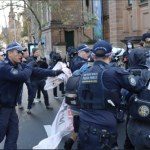Can police enter your home over a domestic dispute?

By Jimmy Singh
Our client was approached by two police officers who attended his home following an allegation of a domestic violence dispute.
Upon attendance, police knocked on the front door several times, then tried to look through the front window. They saw and heard nothing unusual and, after half an hour, decided to go around the backyard where they found a number of marijuana plants.
Police then left and returned to the home with a warrant, which they executed and seized the marijuana plants, and other drugs inside the house.
The evidence of the drugs was ultimately held to be inadmissible, and the charges were therefore “thrown out” out of court – meaning our client was found not guilty. The reason for the inadmissibility was that the officers initially entered the backyard illegally, when they had no authority or power to do so.
When can police enter?
Under the Law Enforcement (Powers and Responsibilities) Act 2002 (the LEPRA), police can only enter your home where they reasonably suspect domestic violence is, has or is about to take place in the following circumstances:
- If you give permission. In that event, police can only enter to investigate whether a domestic violence has been committed, or to prevent further violence; see section 82 of the LEPRA.
- if you refuse permission, police can enter if they have a valid warrant; section 83.
- in an ‘emergency situation’ – namely, where they hold a reasonable belief that a breach of the peace has been, is being or is about to be committed, and it is necessary to end or prevent that the breach; or they believe that a person has suffered significant physical injury, or there is an imminent danger thereof. They are only allowed to remain within the premises ‘as long as is reasonably necessary in the circumstances’; section 9.
Historically, the common law prohibited police from entering private property without permission from the occupier, or without a warrant. The law is there to protect our domestic privacy from being invaded except for compelling reasons, embodying the phrase, “my home is my castle”.
In the US, this concept is so important that it is enshrined in the Fourth Amendment to the Constitution: “The right of the people to be secure in their persons, house, papers and effects, against unreasonable searches and seizures, shall not be violated”.
It is important to ensure police are not acting outside their power or authority, and to know that if they do so, any evidence derived illegally is potentially liable for exclusion.






